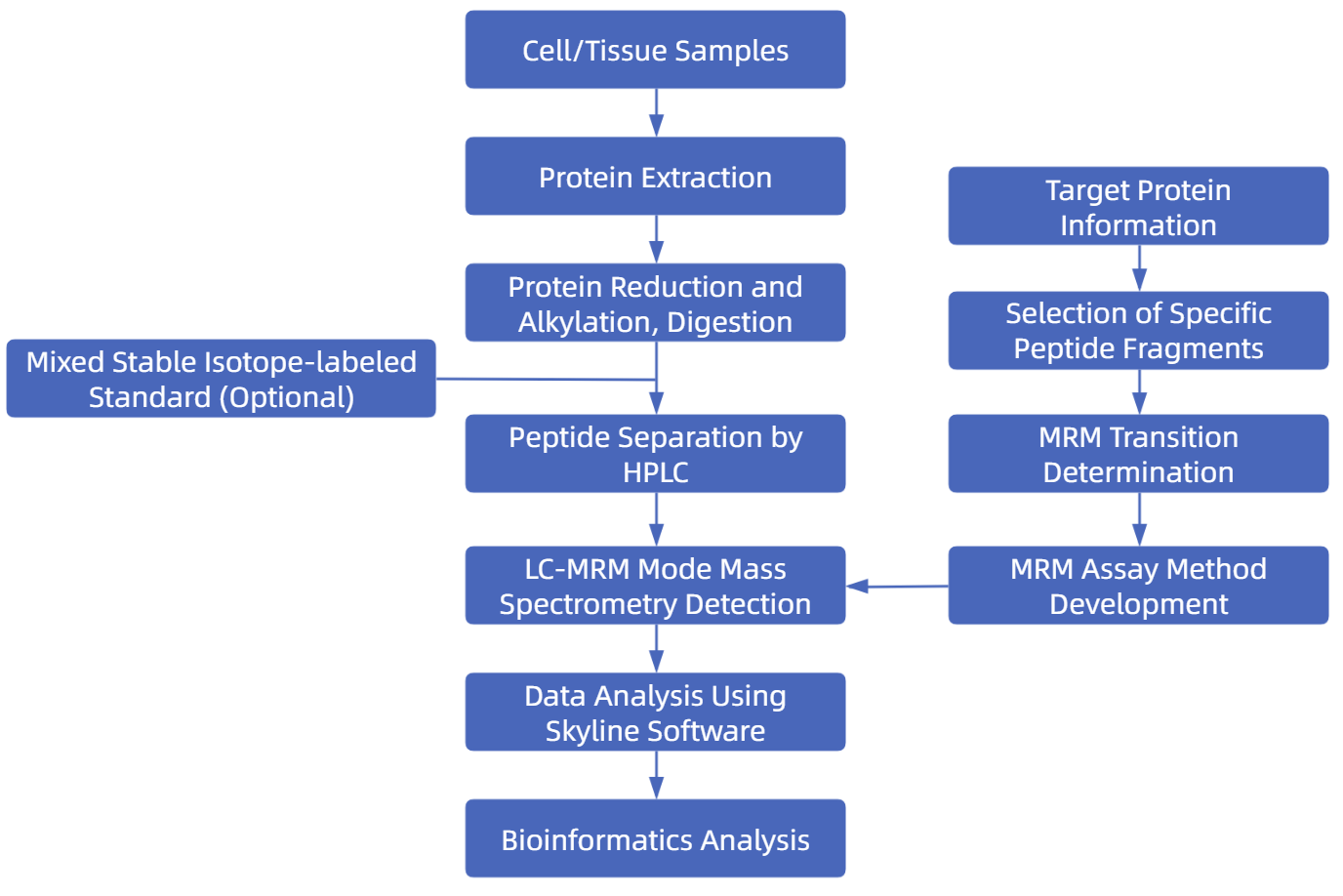MRM/PRM Quantitative Proteomics Service
- MRM spectrum analysis and protein data quality assessment
- PCA of multi-component samples
- Identified protein functional annotation: GO functional annotation, KEGG functional annotation, and COG functional annotation
- Differential protein expression statistical analysis: Venn diagrams and volcano plots
- Differential protein expression clustering analysis: hierarchical clustering and k-means clustering
- Differential protein interaction analysis: protein interaction network analysis based on STRING database
Multiple reaction monitoring (MRM) is a targeted quantitative proteomics research method for target protein. MRM, based on information about the target molecule, selectively chooses data for mass spectrometry data collection, collecting signals that meet the criteria of target ions and eliminating that of ions that do not meet the criteria. MRM mass spectrometry analysis goes through three stages: 1) filtering out parent ions consistent with the specificity of the target molecule through MS; 2) colliding and fragmenting these parent ions to eliminate interference from other ions; 3) collecting mass spectrometric signals from selected specific MS/MS2 ions only. MRM mass spectrometry technology is a high-precision protein quantification technique and is an excellent method for one-time precise quantification of multiple target proteins in complex samples. If isotope-labeled target peptides are used as internal references, absolute quantification of proteins can be achieved.
MtoZ Biolabs utilizes AB SCIEX TripleTOF 5600, AB SCIEX Triple Quad™ 5500, Q Exactive, and Fusion mass spectrometry platforms combined with Nano-LC, launching MRM/PRM MRM/PRM Quantitative Proteomics Service. You just need to provide us with the information about the target proteins you need to study, and we provide a one-stop MRM quantitative proteomics analysis service. It includes establishing and optimizing MRM methods, selecting specific peptides, labelling peptides by isotope, analyzing by mass spectrometry, analyzing raw data, and analyzing by bioinformatics method.
Analysis Workflow

Figure 1. Analysis Workflow for MRM/PRM Quantitative Proteomics
Experimental Instruments
AB SCIEX TripleTOF 5600, AB SCIEX Triple Quad™ 5500, Q Exactive, Fusion
Service Advantages
1. High sensitivity, selecting of ions consistent with the target ions by two-stage mass spectrometry and excluding interfering ions to greatly enhance the signal-to-noise ratio and improve the accuracy of detected target ions.
2. High throughput, the number of protein identified can reach up to 200 at once.
3. Capablility of absolute quantitative analysis without antibodies.
4. High-precision identification of low-abundance proteins and quantitative range across four orders of magnitude.
Applications
1. Result validation of label-free and other non-targeted proteomics.
2. Simultaneous absolute quantification study of multiple proteins/peptides.
3. Study the change of protein families with high homology but lacking specific recognition antibodies.
4. Quantitative study of post-translational modifications of proteins.
5. Absolute quantification study of biological disease targets.
Sample Submission Requirements

For more sample details, please consult our technical team.
Bioinformatics Analysis
Deliverables
1. Experimental Procedures
2. Relevant Mass Spectrometry Parameters
3. Mass Spectrometry Images
4. Raw Data
5. Protein Difference Level Analysis
6. Bioinformatics Analysis
MtoZ Biolabs, an integrated chromatography and mass spectrometry (MS) services provider.
Related Services
How to order?







